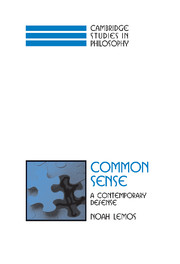Book contents
- Frontmatter
- Contents
- Acknowledgments
- Preface
- 1 The Common Sense Tradition
- 2 Common Sense and Reliability I
- 3 Common Sense and Reliability II
- 4 Reid, Reliability, and Reid's Wrong Turn
- 5 Moore, Skepticism, and the External World
- 6 Chisholm, Particularism, and Methodism
- 7 Common Sense and A Priori Epistemology
- 8 Particularism, Ethical Skepticism, and Moral Philosophy
- Conclusion
- Selected Bibliography
- Index
3 - Common Sense and Reliability II
Published online by Cambridge University Press: 22 August 2009
- Frontmatter
- Contents
- Acknowledgments
- Preface
- 1 The Common Sense Tradition
- 2 Common Sense and Reliability I
- 3 Common Sense and Reliability II
- 4 Reid, Reliability, and Reid's Wrong Turn
- 5 Moore, Skepticism, and the External World
- 6 Chisholm, Particularism, and Methodism
- 7 Common Sense and A Priori Epistemology
- 8 Particularism, Ethical Skepticism, and Moral Philosophy
- Conclusion
- Selected Bibliography
- Index
Summary
In Chapter 2, we considered Sosa's view that epistemic circularity does not prevent us from knowing that our faculties are reliable. We looked at both track record arguments and the Neo-Moorean argument for the reliability of our faculties. In this chapter, we consider some objections raised by Richard Fumerton and Jonathan Vogel to the use of both sorts of arguments and, more generally, to the view that one may use a faculty or source of belief in order to know that it is reliable. We conclude with some further reflections on the value of track record and Neo-Moorean arguments.
FUMERTON'S OBJECTIONS
As we saw in Chapter 2, Fumerton claims that one cannot use memory to justify the reliability of memory or use sense perception to justify the reliability of sense perception. Consider the following objection raised by Fumerton:
If a philosopher starts wondering about the reliability of astrological inference, the philosopher will not allow the astrologer to read in the stars the reliability of astrology. Even if astrological inferences happen to be reliable, the astrologer is missing the point of a philosophical inquiry into the justifiability of astrological inference if the inquiry is answered using the techniques of astrology … If I really am interested in knowing whether astrological inference is legitimate, if I have the kind of philosophical curiosity that leads me to raise this question in the first place, I will not for a moment suppose that further use of astrology might help me to find the answer to my question.[…]
- Type
- Chapter
- Information
- Common SenseA Contemporary Defense, pp. 48 - 66Publisher: Cambridge University PressPrint publication year: 2004



